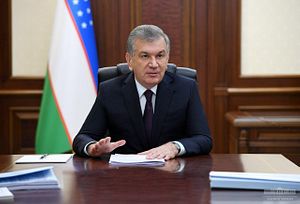When Uzbekistan’s strongman Islam Karimov died in 2016, few believed that good things were in store for the country he had headed since the fall of the Soviet Union. Uzbekistan’s post-Soviet transition had stalled; its democratic potential cut off by authoritarianism, corruption, repression, and a stagnant economy based on rent-seeking and cash crops. Observers predicted a power vacuum, possibly violence, conceivably even the rise of fundamentalist extremism. Even after power was transferred peacefully to the former prime minister, Shavkat Mirziyoyev, reforms that the new president promised seemed too good to be true. The BBC, for example, noted in October 2016 that observers believed “this honeymoon period will unlikely last very long … soon, sticks will replace carrots.”
But, nearly three years later, Mirziyoyev’s reforms continue. Uzbekistan, Central Asia’s most populous state and one of the most repressive and isolated countries in the world, scored dismally in the Bertelsmann Transformation Index; the BTI 2018 ranked it in position 117 out of 129 countries for good governance. However, the new administration’s attempts at reform might see its standing improve in the next BTI update.
In January 2018, Rustam Inoyatov, chief of the National Security Service since its establishment in 1995, was dismissed, and a purge of high-level security personnel continues, breaking the strength of this previously omnipotent “shadow power.” The prosecutorial system, too, is undergoing reform. Three General Prosecutors have been dismissed for abuse of office and corruption since February 2018, the General Prosecutor’s Office saw 1,200 staff members fired in March 2019, and in May, the president signed a decree designed to create an academy to train new prosecutors. Current prosecutors are to be obliged to retrain every three years. Meanwhile, thousands of political prisoners have been released, among them journalist Muhammad Bekjanov, imprisoned since 1999.
Draconian controls on media have been loosened to some extent; in May 2019, the government lifted its censorship of a range of international news websites, although the U.S.-government-funded RFE/RL’s Uzbek service remains a notable exception. While harsh criticism of the government remains out of bounds, media outlets are able to cover sensitive topics such as corruption, and some foreign journalists are now allowed to enter the country.
Highest on Mirziyoyev’s agenda is economic modernization – and many of his other reforms seek to support this goal. When the president took office, export competitiveness was deteriorating and the poor business environment held back foreign investment. Meanwhile, the working-age population is growing fast, half of the country’s population is under 30. In 2017, Uzbekistan’s working-age population of 23 million formed 72 percent of the total population, and that number is predicted to rise to 27 million by 2030. The unemployment rate was 7.5 percent at Karimov’s death in 2016, artificially lowered by the number of economic migrants working in Russia and elsewhere. Young people bore the brunt: one in 10 of 20-24-year-olds were not even seeking work.
Increasing economic competitiveness is the key to improving living standards, and to do so,both social and economic reforms are needed in order to attract much-needed foreign investment. Currency controls were abolished, and visa liberalization allowed citizens of 65 countries – tourists and investors – to enter Uzbekistan without a visa. Exit visas, too, were done away with, allowing Uzbeks to travel beyond the former Soviet Union at will.
The end of forced labor in Uzbekistan’s cotton harvest was a precondition in talks with the World Bank, which, among other assistance, provided the country with a loan of $500 million in June 2019 – although forced labor, while dramatically reduced, has not been stamped out completely. Along with the World Bank, the International Monetary Fund and the Asian Development Bank are providing expertise to the country, especially on privatization of its moribund state-owned enterprises. Investors have responded: foreign investment has risen fourfold.
Rapprochement with neighboring countries was another prerequisite for economic growth. The longstanding disputes over energy and water resources with Tajikistan and Kyrgyzstan are being resolved, and between 2017 and 2018, Uzbekistan’s trade in external goods with neighboring countries rose by 50 percent.
As a result of these efforts, unemployment in 2018 was down to 6.9 percent. Inflation remains a problem, but in the long term, economic restructuring should lead to improved living standards.
Meanwhile, Uzbekistan remains a one-party state. No new opposition party has been allowed to register since 2016, in spite of parliamentary elections meant to be held in late 2019 or early 2020. The purges of old cadres in the security service and elsewhere may be more about shoring up support for Mirziyoyev and his regime than a desire for democratization, as evidenced by the president’s appointment of his sons-in-law Oybek Tursonov and Otabek Shahanov to key positions as head of the presidential administration and deputy head of the president’s security detail. Journalists and civil society activists are still harassed and reports of human rights abuses, including torture, continue to emerge from the country’s prisons. There are limits to Mirziyoyev’s liberalization.
Mirziyoyev may be pursuing the Chinese model, betting that economic rejuvenation and the extension of limited freedoms will cripple most opposition before it can gain a foothold in Uzbek society, while trusting to the tools of repression he retains to take care of the rest. And if so, it might work, and ensure the stability of his one-party regime. But regardless of his intentions, the freedoms that have been extended to date are both genuine and welcome. As the 2018 BTI report noted: “Optimists point to a new course reminiscent in some aspects of perestroika in the Soviet Union, with all its strengths and weaknesses.” The optimists have been proven correct, and restructuring is under way – but it remains to be seen whether or not Mirziyoyev is laying the foundations for a truly open society.
Justine Doody is an editor and analyst specializing in foreign policy and development. She writes for the Bertelsmann Stiftung’s SGI News and BTI Blog.

































